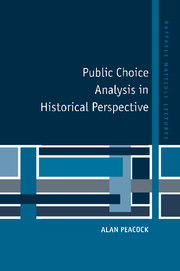Book contents
- Frontmatter
- Contents
- Preface
- PUBLIC CHOICE ANALYSIS IN HISTORICAL PERSPECTIVE
- 1 FIRST LECTURE: The Demand for Historical Perspective
- 2 SECOND LECTURE: Public Choice and the Analysis of Public Sector Growth
- 3 THIRD LECTURE: The Economic Consequences of Public Sector Growth
- 4 FOURTH LECTURE: The Calculus of Consent and Limits on Government Expenditure Growth
- 5 COMMENTARIES
- BIOGRAPHY OF ALAN PEACOCK
- Index
- RAFFAELE MATTIOLI LECTURES
- Frontmatter
- Contents
- Preface
- PUBLIC CHOICE ANALYSIS IN HISTORICAL PERSPECTIVE
- 1 FIRST LECTURE: The Demand for Historical Perspective
- 2 SECOND LECTURE: Public Choice and the Analysis of Public Sector Growth
- 3 THIRD LECTURE: The Economic Consequences of Public Sector Growth
- 4 FOURTH LECTURE: The Calculus of Consent and Limits on Government Expenditure Growth
- 5 COMMENTARIES
- BIOGRAPHY OF ALAN PEACOCK
- Index
- RAFFAELE MATTIOLI LECTURES
Summary
1. Let me first consider the preliminary question dealt with by Sir Alan Peacock: whether the history of economic ideas is an essential part not only of the education but also of the training of an economist, and, what is more, requires professional economists to refer back to it. The masterly treatment by Sir Alan of some of the topical issues of public choice theory in the light of the historical perspective – in the present lectures – should be evidence of its great usefulness.
Let me, however, point out that the methodology followed by him in employing the history of thought to explore theoretical (public choice) issues is very different from that which is commonly considered as the most appropriate in the history of science and therefore – because of the predominant “scientism” – also in economic science. Normally one considers the history of thought as a succession of attempts at approaching the truth, through a process of analytical and empirical improvement, refutation and innovation of knowledge. In this perspective, economists of an earlier period appear as rather naive scholars, whose thought should be merely considered as primitive reasoning to be subsequently replaced by that of their successors. Ideas, in a sense, gradually develop, like a child, from the embryonic to the adult stage, to old age, and finally die.
- Type
- Chapter
- Information
- Public Choice Analysis in Historical Perspective , pp. 115 - 192Publisher: Cambridge University PressPrint publication year: 1992

